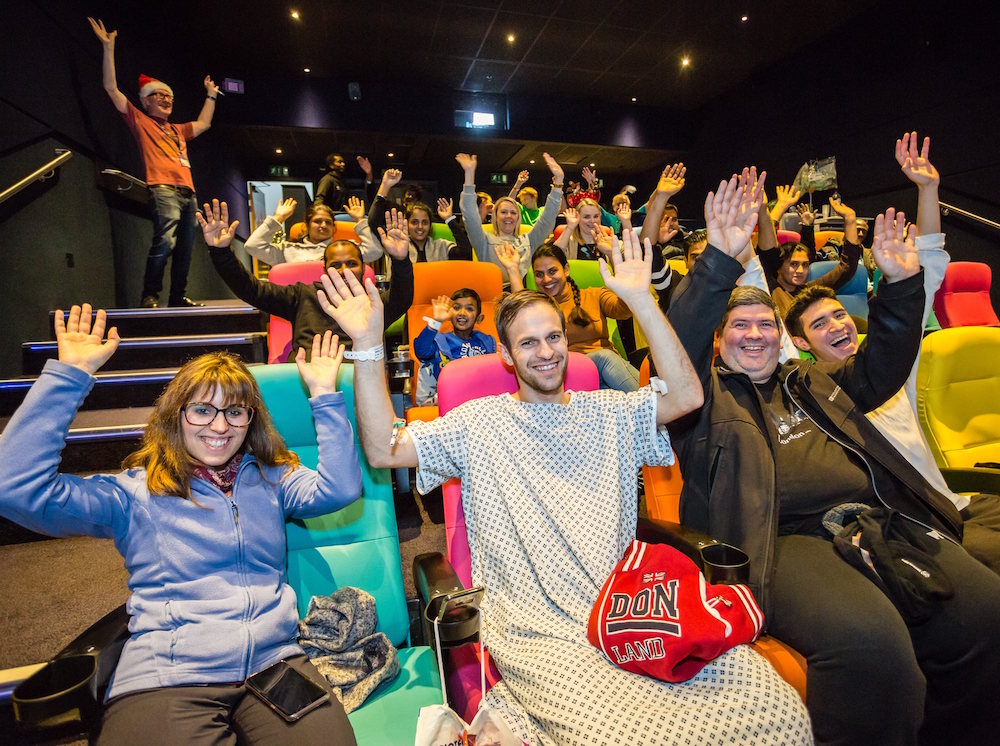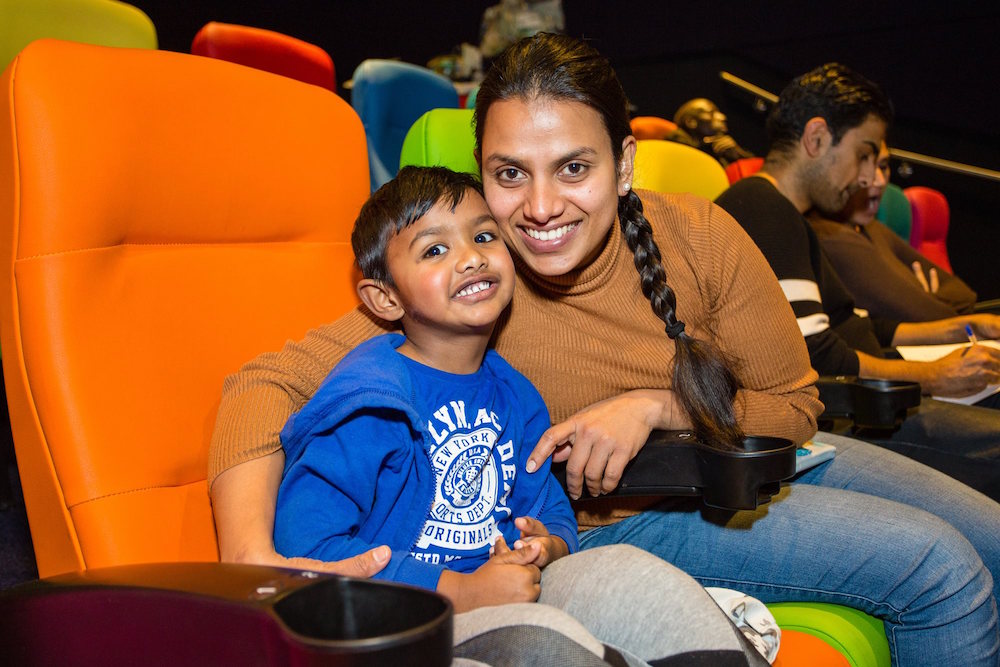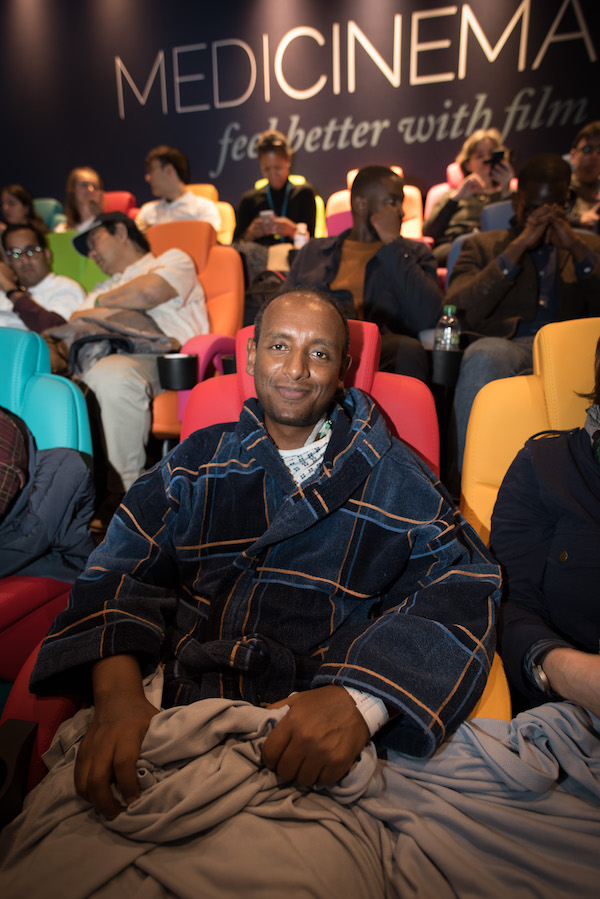Think about it. That moment when you step out of a movie theater after having watched a film you loved. Remember that special spring in your step, that extra bounce in your hair, that feeling that everything is possible in the world? Well, great cinema will do that to you.
But while my own mother was hospitalized in NYC years ago, during a period of personal hell, I discovered that even television use needed to be applied for, approved and then paid for in her room — at premiums that made cable TV seem like buying a pack of chewing gum. Thanks to trusted Netflix, back in the days when you could rent DVDs from the company, each day I would bring my laptop and a choice of her favorite foreign films for me and mom to watch, lying on her hospital bed huddled close. It’s the most beautiful memory, one I cherish from an otherwise horrible time in both our lives.
And yet, what if you could take that one step further and show hospital patients movies, the very day they came out in cinemas and on the big screen? Wouldn’t that take the concept of feel-good cinema one step further? That’s the million dollar question that has been answered by MediCinema, a twenty-something year old organization that has been building cinemas inside major hospital around the UK. And then created partnerships with major movie making, distributing and exhibiting companies to make sure patients saw the same blockbusters everyone else was raving about, on opening weekend.
Check one for the power of cinema.
I meet Adam Johnson, Head of Fundraising for MediCinema, during the Cannes Film Festival. And immediately I ask him where and when the first cinema was built in the UK. “In St Thomas’ Hospital in London, in 1999,” he answers then continues, “that’s the official beginning of the organization and they showed ‘Inspector Gadget’, a Disney release — we’ve got a very long and very successful relationship with Disney.” Yet Johnson admits that “the charity in some way is older than 20 years because the founder, Christine Hill, started in 1996. That’s when she came up with the concept while she was working in St Thomas’.”

So what was the spark of this life-changing idea for hospital patients? “[Hill] came up with the concept seeing the nurses roll the patients out to see the boats go by on the river. Her thought was, what happens when it rains? And she thought cinema is what these children need and that’s how the concept was born.” State of the art facilities where everyone, from patients in beds to wheelchairs, young and old could watch movies — a feat which took three and a half years to build — and showing films the weekend they opened were all part of Hill’s vision. Current facilities, Johnson explains, are “six cinemas UK wide — three in London and then one in Wales one in Newcastle’s and one in Glasgow.” With plans to come, he continues, “by 2025 we want to have opened another six to eight more, fourteen cinemas by 2025. Last year we had about 25,000 patients come to screenings, by 2025 we want to triple that.”
Currently in hard facts, MediCinema offers 19 regular screenings every week across 6 sites (with occasional special screenings too) held 1034 screenings last year, and offered exactly 24,413 cinema experiences to patients and their families.
Helga Charters, the Associate Director of Nursing (CYP) at The Newcastle upon Tyne Hospitals NHS Foundation Trust discloses that the screenings have become “for the chronic long term patients something that they look forward to. They are able to get together with family in a fun, light hearted setting away from the wards. ” In the children it is most noticeable, as Charters explains, simply because “the children always feedback on their time at MediCinema to Play Staff on the fun they have had. You just have to look at their faces to see the enjoyment and positive transformation. Parents love it as they can be a family for a short space of time without clinical input.”
I then ask Charters if she personally believes in the power of cinema and why? “Yes” she answers then addresses the “why” by saying, “escapism — for a brief period minds are immersed in something else which may be funny, thought provoking and often informational.” How a superhero movie, for example, helps a young child, she also explains, “many of our children see themselves as a ‘super hero’ as a result of watching the recent slate of super hero themed films shown at MediCinema. I think this is something that really helps deal with tough moments they are experiencing.”
Everyone wins, thanks to cinema with a conscience.

Melinda Edwards, the Head of Paediatric Psychology at Guy’s and St Thomas’ NHS Foundation Trust, explains the importance of positive cinema and how the idea has evolved in the last years. “MediCinema first began screenings in St Thomas’ Hospital twenty years ago, since then, there is a greater understanding of the importance of mind-body links in the experience and management of illness and health conditions.” She continues, “there is a greater emphasis on the importance of the experience of illness, and the experience of being in hospital as an important factor in determining recovery, healing or coping with illness.”
Cinema is also a connecting factor, a way for a community to come together. It’s why Netflix, in all its greatness doesn’t threaten nor will ever take away from the experience of seeing a movie in a theater. Edwards explains this simply, “the power of cinema is also linked to the ‘community’… a shared experience with others, which can feel safe to release feelings.. sadness, laughter… and an opportunity to share views and stories with others after the film, to have a meaningful experience to share with others.”
I repeat to Edwards the question about believing in the power of cinema, and why. “Yes. most definitely.” She answers, then goes on to explain why. “Cinema has the ability to take you on a journey, which can take many forms and lead to an emotional and psychological growth. For example, it can help people identify with a character and their feelings, helping to recognize, release, or articulate feelings that may have been previously unrecognized. It can transform people from the reality of their situation to a new time, place and dimension, ‘freeing them ‘ from constraints, and enabling a review, or refreshing experience to draw from.”
Even more profoundly, the emotional content of a film has impact, as Edwards illuminates. In fact, it can “leave one feeling relaxed, joyous, uplifted, sanguine, and energized as a result. The power of distraction away from the reality of a difficult situation cannot be underestimated.”
A great film also has staying power, and keeps reminding us of moments in our own lives, as one film does for Edwards, “I was at the beginning of my career as a psychologist when I watched ‘Ordinary People’ and remember how utterly devastating yet revealing the impact on family dynamics and life from an emotionally absent parent… It made me excited and reaffirmed my passion to be a psychologist, although I still feel devastated by the film!”
For Charters, there is a different connection, as she explains that her “go-to film is ‘It’s a Wonderful Life’ in December. I always watch it with my daughter and then we both reference it to each other throughout the year.” Particularly important to note because, as she says, “this is something which shows you how cinema and film moments bring people together.” As far as a personal favorite, she adds, “the film that had the most lasting influence on me was ‘Papillon’ with Steve McQueen – a stunning film in so many ways.”

Charters also shares her own learning experience from MediCinema, which taught her that “patients need the MediCinema as an escape to help them stop worrying or being anxious. They need and benefit from that quality time spent with family.”
I ask Edwards the same, what has she learned about her own work from the experience of having a cinema inside a hospital. “I have learned to be much more respectful and aware of the breadth of resources that can impact and improve well-being for our patients and families. The focus has always been on the medical/nursing care, and often directed solely at the patient… and I have always been a keen promoter of psychological care for families…” She continues, “but through seeing the wonderful benefits of MediCinema, have recognized that psychological benefits can be well provided by others, as a sustainable and normalized therapeutic intervention…and it is the linking of health and psychological care with MediCinema to both understand the value, and clinical significance and to work together to and enable, promote benefits to our patients and families, that makes this work so beautifully!”
From my own personal shady experience with healthcare in the US, I have learned that we have a lot to learn from healthcare providers throughout the rest of the world. While we may be a first world country in terms of democracy and finance, we are sliding deeply into third world status with the lack of care, comfort and kindness in our hospitals. I experienced it first hand and it still makes me shudder today at the thought — seven years later.
So, perhaps a good way to start is to introduce entertainment with a heart, into our health care facilities. To learn a little lesson from our friends overseas in the UK. And more specifically, to learn from MediCinema about the great power of the movies on our body and soul.
I’ll leave you with some wise words from Johnson, about what it’s like to be in charge of fundraising for an organization like MediCinema: “People keep saying the words “no brainer” to me, I don’t always like it as a phrase. But it does apply. As long as people are on board with the idea of how important the arts can be in people’s wellbeing and with people’s improvement in life then you don’t have to say much more.”

